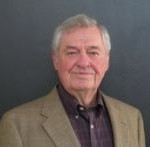
By Julienne Isaacs, ChristianWeek.org
Al Reimer’s fiction pushes boundaries while clinging to tradition
When War Came to Kleindarp, an earthy and provocative collection of stories published this year, is set in the Mennonite town of Kleindarp, easily recognizable as a fictionalized Steinbach.
“I wrote these stories very much out of my own experience,” says Reimer. Though his father was an intellectual who possessed “the biggest library in Steinbach,” Reimer says he was raised according to traditional Mennonite values and expected to attend religious revival meetings, such as the harrowing one captured in the story “Revival.”
“I got away from Steinbach as soon as I could,” says Reimer, who left his hometown at age 18.
After briefly studying opera, Reimer went on to read English Literature and later completed his Masters and PhD degrees at Yale University. He returned to United College, later the University of Winnipeg, to teach in 1960. But it wasn’t until 1971 that Reimer returned to his deepest roots.
At the invitation of his father, he travelled to the Soviet Union to visit Mennonite colonies. “It changed my life completely,” he says. “I found my Mennonite identity buried in the Russian Mennonite past.”
When he returned to Canada, he returned to the faith of his fathers as well. “I joined the church and got baptized and became a Christian Mennonite,” says Reimer laying extra emphasis on the word “Christian.”
“I had been neglecting my true identity for a long time.”
Reimer made five additional trips to Russia and spent the following decade intensively researching Russian Mennonite history, partly in preparation for his novel, My Harp is Turned to Mourning, and partly to feed his own growing passion for the subject. “They were the richest years of my life,” he says.
Now retired and Professor Emeritus of the University of Winnipeg, Reimer has plenty of time to research Mennonite history and write short stories such as those in When War came to Kleindarp, which balance on a knife edge between memoir and fiction. These character-driven stories present a picture of faith and culture which is far from idealistic and simmer with real-life drama.
Not that they are meant to be read as social history. “There is a significant difference between the reality of fiction and the reality of the outside world—fiction presses the envelope, exaggerates reality,” Reimer argues. However, his commitment to truth-telling cannot be disputed. While he writes primarily for a Mennonite audience, Reimer aims to present a true picture of the historical Mennonite culture that “can stand for Mennonites as they are.”
But there is no mistaking the warmth in Reimer’s tone as he speaks of his Mennonite heritage.
“One thing I’ve thought about is what the life span of Mennonite culture will be. We are so integrated that our culture is fading out.” While he admires the work of high-profile writers like Miriam Toews and David Bergen, Reimer observes dryly, “You wouldn’t even know they were Mennonite. It’s inevitable, but I’m sorry to see it happen. The end of Mennonite culture didn’t come with the passing of Low German, but it’s impossible to maintain forever.
“These stories try to keep that tradition alive.”
